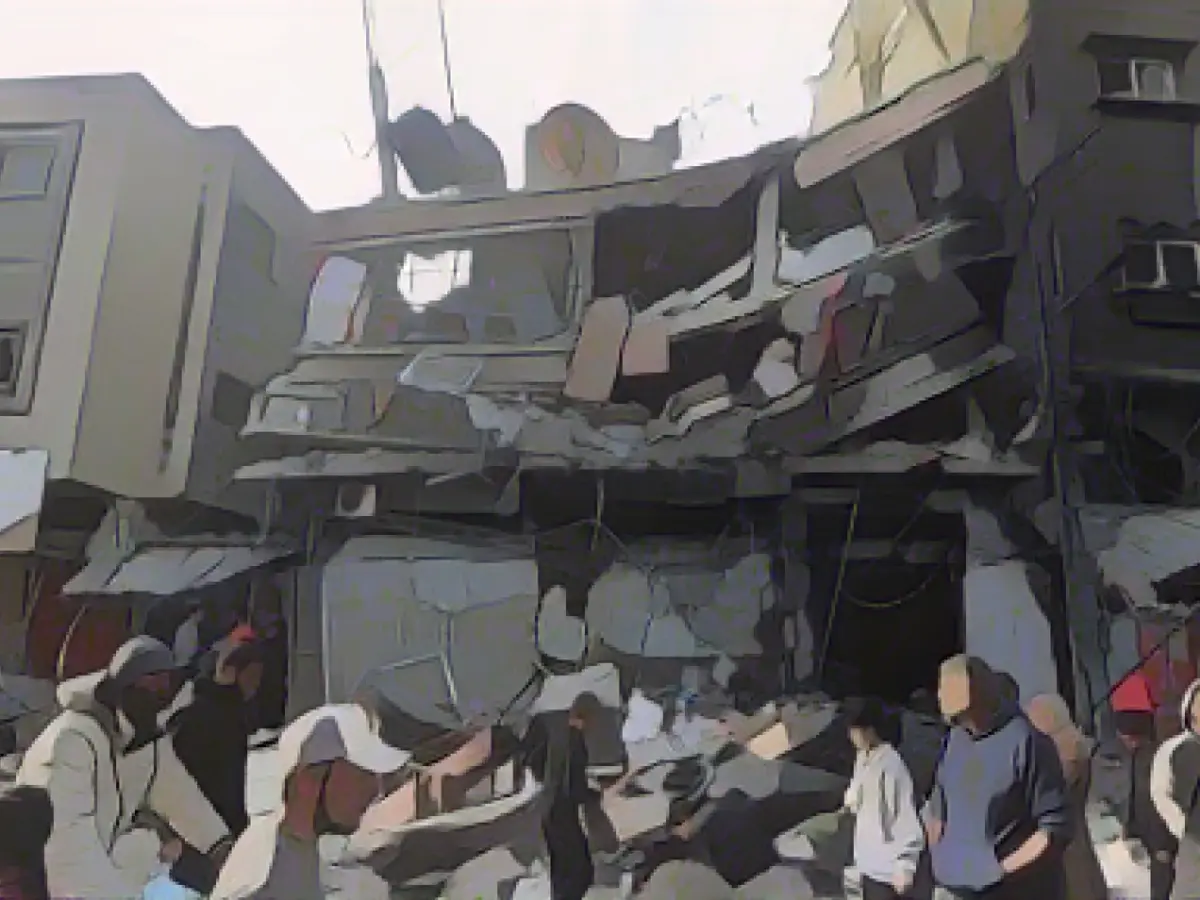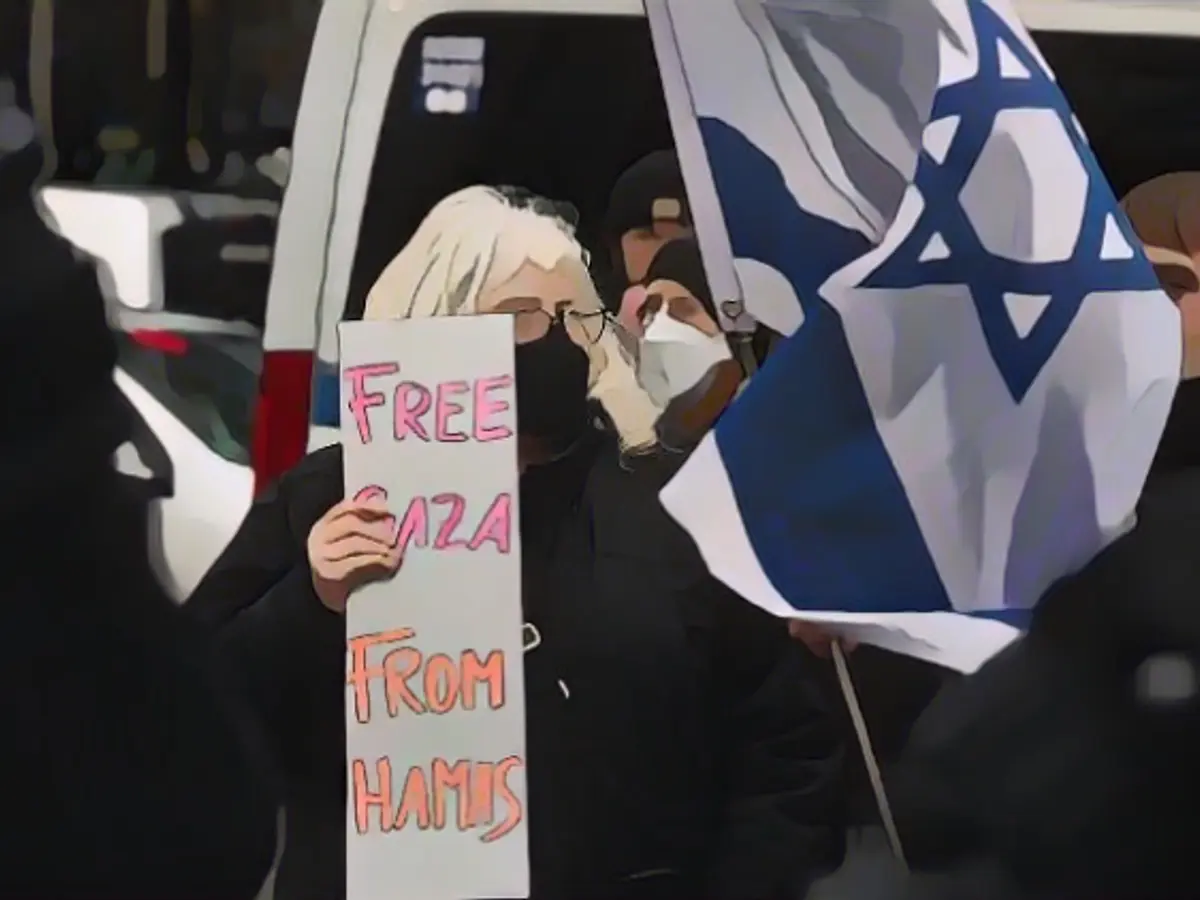In the midst of relentless fighting throughout Gaza, Israel's military has deemed the situation in Chan Junis, the largest city in the south, as the most intense since the commencement of the ground offensive. Troops are now deeply embedded within this populace-dense locale, as announced by the Israeli military.
Meanwhile, the north of Gaza continues to be a battleground. In terms of fatalities, battles engaged, and intensity of aerial and ground attacks, this day stood out as the most intense thus far since the start of the offensive in the northern region at the end of October. The international community's criticism of Israel's actions continues unabated.
According to the United Nations, the escalation of violence in the south following the end of the several-day ceasefire on Friday has led to an alarming rise in civilian fatalities. "The number of civilians killed is skyrocketing," stated Philippe Lazzarini, Commissioner-General of the Palestinian Relief and Works Agency (UNRWA), in a strongly-worded statement.
Lazzarini lamented that the resumption and expansion of military operations in southern Gaza were bringing back the horrors of the past few weeks. In response to Israeli military appeals, hundreds of thousands of civilians had evacuated to the south from the already contentious northern region.
WHO: A life is lost in Gaza every six minutes
As per World Health Organization (WHO) reports, a life, mostly that of a child or adolescent, is lost in the Gaza Strip every six minutes. "The situation is spiraling out of control," reported a WHO representative from Rafah on the Gaza Strip's border with Egypt. He addressed reporters in Geneva via a video link.
The Spokesperson for the UN Children's Fund, Unicef, James Elder, denounced Israel's calls for people to leave war-torn districts and seek refuge in supposed safe zones. Elder stated via video link from Cairo that such zones should boast critical amenities like health facilities, adequate water, and food. However, they are usually just sprawling wastelands or simply sidewalks. "I find it callous. It conveys a disregard for the lives of children and women, and this disregard is lethal," Elder asserted.
Ministry: Over 15,000 dead so far
As per the Hamas-controlled Ministry of Health, around 15,600 people have been killed in Israeli attacks in Gaza. The casualty figures cannot be corroborated independently at the moment, but the United Nations and other observers have noted that the authority's figures have generally proved credible in the past.
According to the Norwegian Refugee Council (NRC), the Israeli bombardment of the Gaza Strip is one of the most destructive attacks on a civilian population since World War II. NRC Secretary General Jan Egeland noted on Tuesday, "Every day, we witness more lifeless children and greater human suffering imposed upon innocent people who bear the brunt of this misery."
UN: The plight of internally displaced people in Gaza surpasses capacity
In view of the ongoing violence and mass exodus, the UN Palestinian Relief and Works Agency (UNRWA) has admitted that it is struggling to cater to the needs of all those seeking refuge. Israel is requesting people from Chan Junis, the largest city in the south, to relocate to Rafah in order to obtain aid. Yet, UNRWA Director for Gaza, Thomas White, confessed on the X platform that his organization would distribute its last 300 tents on Tuesday. "Thousands are sleeping in the open," White warned.
With the resumption of military operations and their expansion in southern Gaza, "the horrors of the past weeks are being repeated," lamented White. At the Israeli army's behest, hundreds of thousands of civilians had abandoned the north of Gaza at the request of the Israeli military and sought refuge in the south of the coastal region.
Report: Israel prepares to flood Hamas tunnels
According to a report in the "Wall Street Journal," Israel is possibly preparing to flood the tunnels belonging to the Islamist Hamas. A system of large pumps is believed to be employed to flood the intricate network of tunnels beneath the Gaza Strip.
As the newspaper reported, citing US government officials, it remains unclear whether the Israeli government intends to flood the tunnels. Israeli Army spokesman Richard Hecht confirmed on Tuesday, "We are employing all the means at our disposal to neutralize the tunnel system."
Israel claims to possess intelligence information on hostages held by Hamas
When asked whether the military had any intelligence on the location of hostages, an army spokesman acknowledged, "Yes, we do." He could not, however, disclose any further details.
Israel presumes that 137 hostages are still being held. At least 240 people had been taken prisoner in Gaza during the Hamas terror attack. Recently, 105 hostages were released in exchange for 240 Palestinian prison inmates detained in Israel.
Rocket alerts in Israel
Meanwhile, fresh rocket alerts erupted on the Israeli side of the border with the Gaza Strip, as well as in Tel Aviv and the country's central regions. The Israeli news website ynet reported that a total of 15 rockets had been launched from Gaza towards the greater Tel Aviv region.
The conflict was initiated by the worst massacre in Israel's history, carried out by terrorists from Hamas and other extremist groups in Israel on October 7, near the border with the Gaza Strip. The attacks resulted in the death of more than 1,200 individuals, including over 850 civilians.
Baerbock: Israel must adhere to international humanitarian law
Foreign Minister Annalena Baerbock urged Israel to comply with international humanitarian law in view of the escalating humanitarian crisis. "Israel has the right to protect its population within the framework of international law. However, the decisive factor is how Israel proceeds in this new phase," Baerbock said following a meeting with her Slovenian counterpart, Tanja Fajon, in Ljubljana.
"Israel has the responsibility to adhere to international humanitarian law, to alleviate civilian suffering, and to protect the civilian population during the course of these measures," Baerbock emphasized. "Because far too many Palestinians have already fallen victim to this conflict," she added.
Emir of Qatar accuses Israel of genocide in Gaza
The Emir of Qatar implicated Israel in genocide through its military actions in the Gaza Strip. In his opening remarks at the summit meeting of the heads of state and government of the Gulf Cooperation Council in Doha, the Emir noted, "The right to self-defense does not warrant genocidal acts that Israel has perpetrated in Gaza."
"It is an embarrassment for the international community that such heinous crimes have been allowed to persist for nearly two months, with systematic and deliberate slayings of innocent civilians, including women and children," the Emir protested. Qatar had recently facilitated dialogue between Israel and Hamas. Simultaneously, Qatar also provides sanctuary to leading Hamas members.
Climate activist Greta Thunberg and other members of the Swedish branch of the climate protection group Fridays for Future also accused Israel of genocide in the Gaza Strip. Thunberg and her colleagues published an op-ed in the Swedish paper "Aftonbladet" and the United Kingdom's "Guardian," accusing the Islamist Hamas, which governs Gaza, of "murdering Israeli civilians in a barbaric attack" and justifying Israel's "ongoing war crimes."
Fighting erupts again on Israel's border with Lebanon
According to Lebanese sources, multiple injuries and fatalities have resulted from renewed shelling on the border between Lebanon and Israel. The Lebanese military confirmed that at least one soldier was killed in an Israeli attack on a military installation in the border area.
This is the first Lebanese soldier to have been killed during the current conflict. Security officials in Lebanon also reported one injury stemming from an attack on a residential building. Israel has yet to comment on the incident. The shelling followed a series of assaults on Israeli territory by the Lebanese Hezbollah.
Read also:
- [Saxony seeks to impose further restrictions on "right-wing rock" concerts][1]
- Despite intense fighting, Israel's military declared the day in Chan Junis, the largest city in southern Gaza, as the most intense since the ground offensive began.
- The UN takes issue with the escalation of attacks in the south of Gaza, which surged following the ceasefire, resulting in a rapid rise in civilian casualties.
- According to WHO, a life is lost in Gaza every six minutes, illustrating the deteriorating situation in the region.
- Unicef spokesperson James Elder condemns Israel's calls for people to relocate to districts deemed safe on the grounds of their lack of essential facilities.
- The Hamas-controlled Ministry of Health discloses over 15,600 fatalities in Israeli attacks, but these numbers cannot be independently authenticated.
- The Norwegian Refugee Council estimates the Israeli bombardment of Gaza as one of the worst attacks on a civilian population in recent history.
- UNRWA Director for Gaza, Thomas White, voices concerns over his organization's incapacity to cater to the growing number of internally displaced individuals seeking refuge.
- A report alleges that Israel is planning to flood the tunnels used by Hamas in Gaza using a system of large pumps.
- An Israeli army spokesperson refuses to confirm or deny the use of flooding tactics but confirms that the military is employing all means to combat the tunnel system.
- Israeli forces possess information on the location of hostages held by Hamas, according to an army spokesperson.
- Renewed rocket alerts in Tel Aviv and other central regions of Israel confirm that 15 rockets were fired from Gaza towards the greater Tel Aviv area.
- German Foreign Minister Annalena Baerbock calls on Israel to adhere to international humanitarian law, ensuring protection of the civilian population in the Gaza Strip.
Source:
Enrichment Data: The turmoil in Khan Yunis, the largest city in southern Gaza, is a result of ongoing conflict between Israel and Hamas. Here's a summary of recent developments:
Current Situation
- Conflict History
- Battle of Khan Yunis began on December 1, 2023, as part of the Israeli invasion of the Gaza Strip. It developed into a siege in late January 2024.
- The conflict has seen heavy fighting with both sides suffering significant losses. Israeli forces have carried out airstrikes, artillery strikes, and ground operations, while Hamas has employed mortar shells, rocket-propelled grenades, and tunnel attacks.
- Recent Developments
- On January 24, 2024, an explosion followed by building collapse in Khan Yunis resulted in the loss of 21 Israeli soldiers, marking the deadliest day for the IDF since the ground invasion began.
- By February 2024, Israeli forces had dismantled all Hamas battalions in Khan Yunis, but had yet to claim operational control over the area.
- On February 16, 2024, the IDF raided the Khan Yunis refugee camp, resulting in the death of at least 30 militants. This was part of an effort to clear the area.
- By April 2024, Israeli forces withdrew from Khan Yunis as part of a broader withdrawal from the southern Gaza Strip. However, rockets were fired by Palestinian forces immediately after the withdrawal.
- Humanitarian Impact
- The conflict has had a catastrophic humanitarian impact. As of February 18, 2025, the Ministry of Health in Gaza reported the death of at least 48,291 Palestinians and the injury of 111,722 others since October 7, 2023.
- Humanitarian aid efforts are ongoing, with food security partners bringing over 57,000 metric tons of food into Gaza since the ceasefire. However, medical evacuations outside Gaza remain critical due to the health system's challenges.








